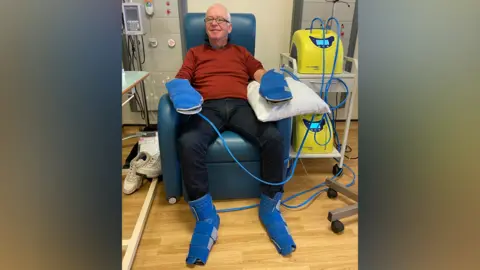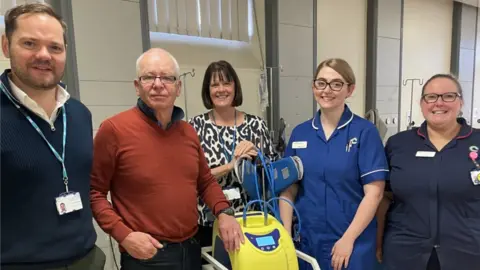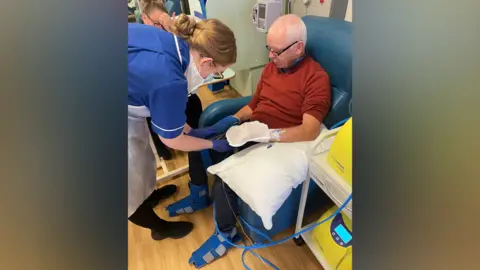Clatterbridge: Cancer drug side-effect cooling system trialled
 Clatterbridge Cancer Centre
Clatterbridge Cancer CentreA hand and foot cooling system is being trialled at a hospital on Merseyside to try reduce the painful side effects of chemotherapy.
Clatterbridge Cancer Centre wants to help patients avoid pain, numbness or tingling in fingers and toes, knowns as peripheral neuropathy.
Brian Conroy, 64, from Birchwood in Warrington is taking part in the trial.
He said he hoped using the gloves and boots would mean he could return to work as a construction worker.
Mr Conroy was diagnosed with bowel cancer in August 2023 and underwent surgery six weeks later.
The cancer was successfully removed and Brian, a self-employed construction worker, received a course of the chemotherapy drug, Oxaliplatin, to try to stop it coming back.
For some people pain from peripheral neuropathy can become permanent and in very rare cases they might be required to use crutches and simple tasks like doing up buttons can become impossible.
 Clatterbridge Cancer Centre
Clatterbridge Cancer CentreThe trial sees special gloves and boots used to reduce the temperature of a patient's hands and feet to around 15 degrees Celsius.
Mr Conroy said: "I want to make sure I can continue to use my hands and feet as normal once I'm fully recovered so I can get back to work as quickly as possible.
"I'm grateful for the opportunity to be a part of this project".
 Clatterbridge Cancer Centre
Clatterbridge Cancer CentreThis project was inspired by a University of Liverpool medical student Emily Kelly, 28, from Chester.
On her placement at Clatterbridge, she told Consultant Clinical Oncologist Doctor Rick Walshaw about her mother's experience of bowel cancer, which "planted the seed" that led to the trial.
"I'm always keen to encourage this sort of innovative thinking, particularly in our doctors of the future," Doctor Walshaw said."My hope is that it is, and we can begin using the system on a more permanent basis with the aim of preventing these patients from suffering with peripheral neuropathy, which can be very debilitating."I would hope all types of cancer patients being treated with chemotherapy drugs that can cause similar side effects will benefit from the cooling system."
Bowel Cancer Clinical Nurse Specialist Jeanette Ribton said peripheral neuropathy pain could be permanent or continue long after the treatment has finished.
She said if the feasibility project was successful the cooling system could help "people to go about living their lives as normally as possible after cancer".

Why not follow BBC North West on Facebook, X and Instagram? You can also send story ideas to [email protected]
